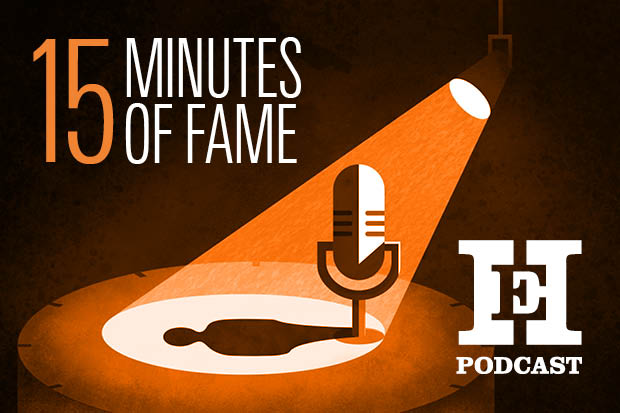|
Getting your Trinity Audio player ready...
|
“It just felt like podcasting was made for history,” HistoryExtra’s Dr David Musgrove told us. As the podcast celebrates its 15th birthday, it has also just broken another significant milestone: 150 million listens.
Just over a year ago, Immediate Media’s HistoryExtra podcast reached 100 million listens. Now, the award-winning show, produced by the BBC History Magazine and HistoryExtra.com editorial team, seems unstoppable, attracting over four million listens a month.
The HistoryExtra podcast is also celebrating its 15th anniversary this month. To mark the occasion, the team is releasing a series of 15 episodes called 15 Minutes of Fame. Leading historians – including Suzannah Lipscomb, Tom Holland and Janina Ramirez – have nominated somebody from history who is less famous than they ought to be, to explain what they did and why they should be more well-known.

Ahead of the anniversary, we spoke to Dr David Musgrove, content director of the HistoryExtra.com website and podcast. He explained why the podcast’s long history has set it up for success, how it helps grow the print magazine, and what other publishers can learn without needing to publish daily.
Early to audio
When the podcast first launched in 2007, it was monthly. It took a while to really start driving any significant traffic numbers, meaning Musgrove kept having to justify the investment to senior leadership. “There were budget meetings where I was having to justify and explain why we’re investing in this sort of thing when there’s no clear return!” said Musgrove. Now, the podcast is on course to deliver seven figures in revenue this year.
“From the off, we committed to a very simple format, a very simple proposition,” Musgrove explained. “BBC History Magazine had access to leading historians. There wasn’t really a medium back then through which they could say what they wanted to in an extended format.”
“We just thought, ‘We talk to these guys on a regular basis. Let’s record it, let’s let them talk at length without interrupting them, let’s ask them reasonable questions.’ It just felt like podcasting was made for history in a way, because there’s so many good stories to tell.”
Although the basic proposition has stayed the same, over the course of the past 15 years, the HistoryExtra podcast has ramped up in frequency, evolving to the point it publishes six days a week. This has helped rack up the listener numbers, but Musgrove has also seen a more recent inflection.
“Certainly in the last few years, we have seen a big spike in audience listens,” he said. “I think that’s reflective of a more general interest in podcasts. Lots more people have access and know what a podcast is, compared to 2007.”
Given the recent explosion in the popularity of podcasts – with 45% of podcast fans only having started listening in the last year – it is not inconceivable that HistoryExtra may reach 200 million listens a little sooner than they anticipate.
Six days a week
An almost daily podcast publishing schedule is not for the faint-hearted. HistoryExtra has a podcast editor and an editorial assistant whose sole responsibility is to be working on content. Immediate Media also has an in-house production team who transform the raw audio around each day across their whole podcast portfolio. The editorial team for the print magazine are also involved in the interviews. Musgrove estimated that around 10 staff are involved in interviewing, although the pandemic has meant that they now tend to do many of the interviews remotely rather than having to travel.
“Right now, we’re doing pretty much all our podcasts using virtual technology, but there are things we need to think about with that,” he explained. “How do you build a rapport? Most of the time we try and do a pre-discussion before the interview to make sure they’re at ease.”
“It’s not just a case of, do the interview and walk away. We’re spending a fair bit of time making sure that it’s actually a decent quality interview.”
Musgrove said that there is a groundswell of people who listen to the podcast every day. The episodes are between 20 minutes and an hour in length, with Sunday editions being longer. In lockdown, the HistoryExtra team added an additional podcast, making it seven episodes a week. But audience feedback from devoted listeners suggested that there was just too much to listen to.
Instead, they focused on making the Sunday edition longer – often an hour plus – and involving listeners. The ‘Everything you want to know’ franchise focuses on a big topic such as the Black Death or Mediaeval childhood. An expert historian is interviewed, with questions crowdsourced from social media and search trends.
“Those have proved to be perennially popular,” Musgrove noted. Similar to how evergreen features work on publisher sites, deeper dive episodes based on what people want to find out can have a very long shelf life. “Those are the ones which are in the top 10 listens in the last couple of years,” he added.
Premium podcast subscriptions and series
Over the past year, the HistoryExtra team have been looking outside the basic interview format into narrative-style, multi-part series. “They are super popular, people really enjoy those sorts of podcasts,” Musgrove said. The first one was an eight-part series looking at the Princes in the Tower, with more recent series looking at the Salem witch trials and the end of Roman Britain.
“They require a lot more work than it does to do a single interview,” Musgrove elaborated. “It’s a whole bunch of interviews with a whole bunch of experts, and then requires skills to edit, clip out the interview sections, and actually make a long-form narrative series. We’re doing more of that, and that’s really showing our investment in the audio proposition.”
Deep-dive series like these have opened the door to other monetisation opportunities aside from advertising. Since Apple introduced Apple Podcast Subscriptions – a paid podcast tool – in summer last year, HistoryExtra has been one of the Immediate Media podcasts trying it out. For £1.99 a month subscribers on Apple can access HistoryExtra Plus: Specials, which gives early-release access to the special series, channels dedicated to certain topics like Medieval history or Roman history, and ad-free access to all HistoryExtra podcasts. Musgrove declined to give specifics but did say he was “pleasantly surprised” at the interest in it.
However this isn’t the only way the podcast is being used to generate revenue. Ad-free and premium episodes have recently started to be bundled as part of HistoryExtra’s new digital paywall. A monthly digital subscription is £5.99 a month, with the annual currently on offer for £34.99.
A rising tide for print too
Looking at the podcast’s success, it’s easy to forget that the brand is primarily a print magazine. The magazine and any special issues are regularly mentioned across episodes. So what effect has such vast listener numbers had on the print subscription?
“[BBC History Magazine] has had ten years of continued circulation growth,” said Musgrove, who is also very involved with the print side. “We had a little bit of a dip with Covid – but then who hasn’t? I would contend that part of that was the fact we had this podcast, which was doing numbers and finding an audience.”
“The podcast has also helped us to branch out to digital iterations as well. We were a first mover into some of the digital editions as a history magazine. We built up a pretty substantial digital edition business. And I would say that was because we’d developed a digital audience; people who were aware of what we are and what we’re about, and who were digitally savvy.”
With the podcast now a leading product at HistoryExtra, at what point does BBC History Magazine become an audio-first publisher? “It’s actually a phrase we have bandied around a bit because it is such an important part of what we’re doing now,” Musgrove hinted. “The audio production of things is so embedded in what we’re doing with the print and web development.”
“I think what’s really interesting for the podcast is to try and find ways to make the most of the content you’re getting. We spend a lot of time creating features and stories out out of the podcast interviews we’ve got. That generates a lot of content that we can reuse and reposition.”
Lessons for other publishers
HistoryExtra has the benefit of having got into podcasts very early. 150 million downloads isn’t a realistic milestone for many other publishers for some years yet. But Musgrove did have some advice for publishers with their own podcasts, or those looking at starting them.
“Every publisher needs a multi-strand commissioning strategy these days,” he said, noting that he still sees a strong future for print magazines. “Having a podcast that ties in with your print, editorial and web strategy as well, you can get really good synergy.”
He advises publishers to look through which bits of the editorial mix would easily translate to audio. “You’ve got to do something that’s simple, that is deliverable, that you can commit to and deliver on a regular basis. There’s no point in doing something that’s a flash in the pan.”
That doesn’t mean limited series or seasons are off the cards though. “Give the audience something they can recognise as an editorial product in the same way that a magazine is a recognisable editorial product,” Musgrove emphasised. “Build off your strengths, find something that is coherent and obvious, and related to what you’re about.”



